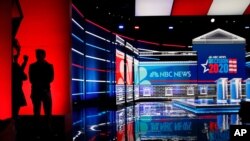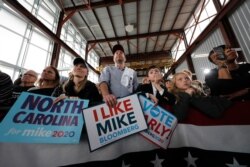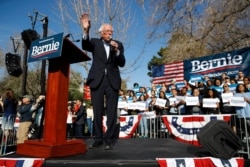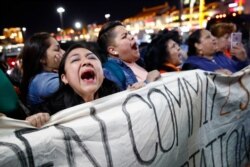Six Democratic candidates are gathering Wednesday in Nevada for the ninth debate in the race to be the party's nominee to oppose U.S. President Donald Trump in November's general election.
Vermont Senator Bernie Sanders and former South Bend, Indiana, Mayor Pete Buttigieg enter the debate fresh off strong performances in Iowa and New Hampshire, the first two states to make their selections in the nominating contest.
Minnesota Senator Amy Klobuchar is looking to ride momentum from a surprise third-place finish in New Hampshire into the debate and Saturday's caucus in Nevada.Among the candidates for whom the debates and Saturday's voting are a chance to break through and recapture the support that made them strong contenders in earlier national polls are former Vice President Joe Biden and Massachusetts Senator Elizabeth Warren.
Bloomberg
On the stage for the first time will be former New York City Mayor Michael Bloomberg, a late addition to the contest whose name is not even on the ballot in Nevada but who has surged in national polls in recent weeks while spending hundreds of millions of dollars of his own money on his campaign.
Christian Lundberg, an associate professor at the University of North Carolina, told VOA's Russian service he thinks Sanders will try to position himself as the leader in the early voting, with Biden and Warren "doing damage control."
In the case of Bloomberg, he expects a candidate who will cast himself as the most electable candidate and best choice to go up against Trump.
"The dynamic that Bloomberg really is interesting on is that he gives all the existing candidates a really nice opportunity for an attack that helps them to kind of build back up their progressive credentials," Lundberg said.
Sanders leads polls
Public opinion polls in Nevada show Sanders as the clear leader, but after that the race is less clear with different polls showing varying levels of support for Warren, Biden, Klobuchar and Buttigieg.
A Las Vegas Review Journal poll released last week had Sanders with 25% support, followed by Biden at 18%, Warren with 14%, billionaire Tom Steyer at 11%, and both Buttigieg and Klobuchar at 10%.
Steyer failed to qualify for the debate, after participating in the past five events.
Candidates are seeking to appeal to a different demographic makeup this time after competing in two overwhelmingly white states.
Nevada voters
Nevada's population is about 29 percent Hispanic, 10 percent African American and 10 percent Asian.
University of Nevada, Las Vegas political science professor Dan Lee told VOA's Russian service that Nevada's caucus is arguably the first test of how truly viable the candidates are.
"So for instance, Buttigieg performed quite well in New Hampshire and in Iowa, but then does that translate to the core Democratic support? A lot of the core support is African Americans and now to a growing extent Latino voters," Lee said. "So how he performs in Nevada is going to go a long way to saying exactly how viable he truly is."
Democrats will compete again this month in South Carolina, before the contest really expands March 3 with voting in 14 states, including huge prizes California and Texas.








